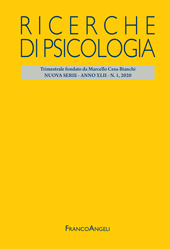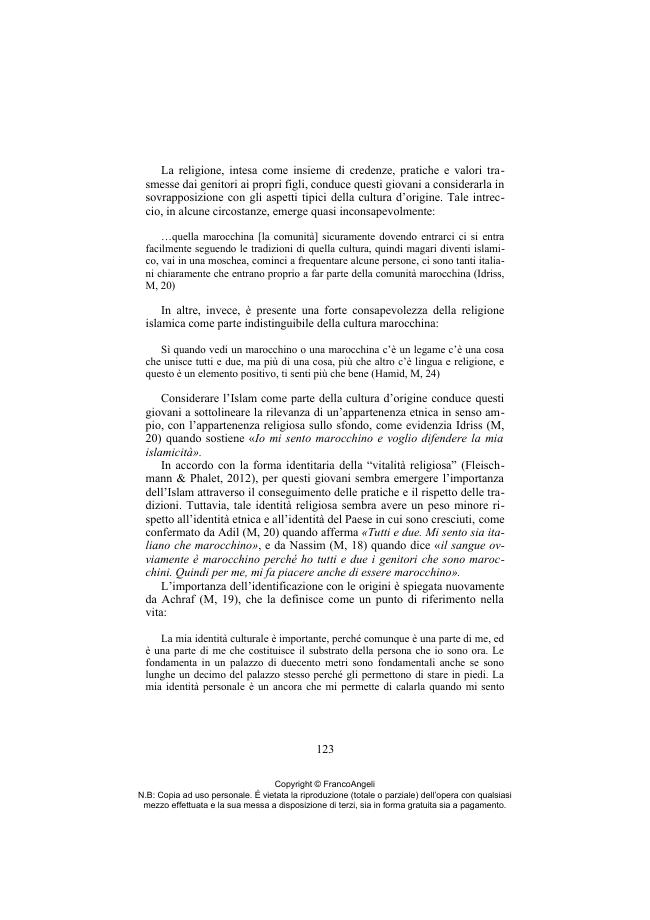Religione e identità multiculturali nelle seconde generazioni di musulmani in Italia
111-134 p.
Una delle principali sfide che le seconde generazioni di immigrati devono affrontare e rappresentata dalla costruzione di un'identità sulla base di una doppia appartenenza culturale. Tale costruzione deriva, da una parte, dalla trasmissione culturale dei loro genitori e, dall'altra, dalla pretesa assimilativa esercitata dalla società occidentale nei loro confronti. In aggiunta, nel caso delle seconde generazioni di immigrati cresciute in famiglie che confessano la fede islamica, la complessità nella costruzione identitaria può essere esacerbata dalla presenza di una religione difficilmente conciliabile all'interno delle società occidentali. Tra le sfide che questi giovani devono affrontare, emerge un'ulteriore complessità per le giovani musulmane, data dalla scelta di indossare il velo. Infatti, questa pratica viene spesso considerata dagli autoctoni come simbolo della subordinazione della donna alla volontà dell'uomo.
L'obiettivo di questo studio è stato indagare, quindi, quale fosse il ruolo dell'Islam nella costruzione di un'identità religiosa attraverso un focus sulle principali differenze tra giovani uomini e donne musulmani. In uno studio qualitativo, attraverso interviste semi-strutturate, èà stato indagato il ruolo della religione islamica nella costruzione identitaria in un campione di 20 giovani marocchini di seconda generazione (F = 10; eta 18-27; M = 21; DS = 2.3). Le interviste sono state codificate attraverso il software Atlas.Ti. I risultati hanno evidenziato una relazione tra il genere degli intervistati e il modo in cui viene vissuta la religione. Per i giovani musulmani l'identità religiosa viene considerata come un aspetto culturale ereditato. Per le giovani musulmane, invece, l'identità religiosa viene concepita come un sostegno per l'affermazione della loro identità multiculturale, principalmente attraverso la scelta libera di indossare il velo. [Testo dell'editore].
One of the main challenge for the second generation of immigrants is represented by the construction of an identity on the base of a double cultural membership. This construction is the result, on the one hand, of the cultural transmission of their parents and, on the other hand, of the assimilative claim made by western society towards them. In addition, in the case of second generations of immigrants who grew up in families confessing the Islamic faith, the complexity of identity construction can be exacerbated by the presence of a religion that is difficult to reconcile within Western societies. Among the challenges that these young people have to face, for Muslim women emerges a further difficulty from the choice to wear the veil, a practice often considered by the natives as a subordination of women to the will of men. The aim of the study was to investigate the role of Islam in the construction of a religious identity through a focus on the main differences between young Muslim men and women.
In a qualitative study, through semi-structured interviews, the role of the Islamic religion in the identity construction in a sample of 20 second generation young Moroccans (F = 10; age 18-27; M = 21; SD = 2.3) was investigated. The results showed a relationship between the gender of the participants and the way they expressed religion. For young Muslim men, is considered an inherited cultural aspect. For young Muslims women, instead, the Islamic religious identity is conceived as a support for the affirmation of a multicultural identity, mainly through the free choice to wear the veil. [Publisher's text].
Fa parte di
Ricerche di psicologia : 1, 2020-
Articoli dello stesso fascicolo (disponibili singolarmente)
-
Informazioni
Codice DOI: 10.3280/RIP2020-001006
ISSN: 1972-5620
MATERIE
PAROLE CHIAVE
- Seconda generazione musulmani, Islam, identita, differenza di genere, velo
- Muslim second generation, Islam, identity, gender difference, veil



